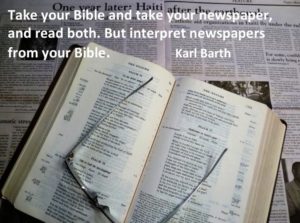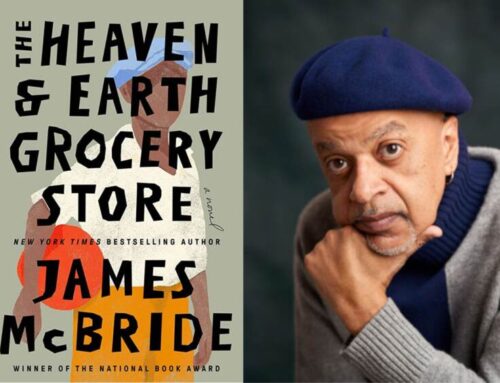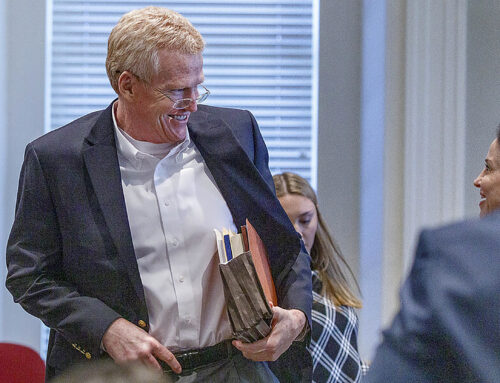
 The question was asked of me recently, “how often do you preach from the Old Testament?” To be honest, I was not all that sure. In order to get a more accurate response I decided to go through the sermons saved to my flash drives. It appears that over the past year I’ve only preached from the Old Testament on eight occasions. That’s less than once a month.
The question was asked of me recently, “how often do you preach from the Old Testament?” To be honest, I was not all that sure. In order to get a more accurate response I decided to go through the sermons saved to my flash drives. It appears that over the past year I’ve only preached from the Old Testament on eight occasions. That’s less than once a month.
This same person then back doored his way into what I believe was his original objective. In an attempt to initially remove any trace of this particular inquiry from him he began by saying, “some folk have been asking.” And while I don’t doubt that, I also don’t believe that he too did not carry some of this similar concern. He went on to say that “some folk wanted to know why your sermons involve so much about politics and race?”
Well, let me say, what a relief this was to finally hear a message that I certainly expected to hear. Every sense being appointed to a very diverse methodist congregation in Prince George’s County Maryland I’ve wondered exactly when the question would come. The congregation is comprised of a mix of South Americans, Caucasians, Caribbean, and a few African American parishioners. Last month in the midst of a sermon series focused on “dreams” I deviated slighted to peer in, homiletically speaking, on a decision that consumed the public discourse of this entire nation.
In particular, I was intrigued by the overwhelming response of my African American brothers and sisters who were also identified as members of the Christian faith. How is it that so many of us were unsettled by the very Christian act of forgiveness expressed by one to another? It seemed the very Christian thing to do. Wasn’t it? Still committed to staying the course and preaching about dreams the closer I got to Sunday the more I became anxious about my own interpretations. Inevitably Sunday came and there I stood before this diverse congregation with a sermon prepared in great time of preparation, prayer, and reflection. The sermon was taken from a parable presented in the New Testament Gospel of Matthew. The parable allowed me to point the sermonic lens on the issue of fairness. Here’s an excerpt from that sermon:
For many or our brothers and sisters in the Christian faith the sentencing of one Amber Guyger and the events surrounding it were found questionable, as it relates to issues of fairness and forgiveness. From what I’ve gathered many are disappointed with the 10 year sentence, but even more interesting was the overwhelming response to the demonstration of forgiveness expressed by a relative of the victim Botham Jean. But if I am transparent, and I must be, even this preacher wrestled with these issues confronting us in the public square. What was it?
What was the cause of such abrasive and genuinely visceral responses? Well over the past year we’ve seen people of color in this country handed down much more rigid sentences for far lesser crime. Mothers who’ve been sentenced much harsher for putting their children in schools outside of their home district. Women who’ve been given double the amount for merely firing weapons into the air. And the list goes on and on.
The one common denominator in all of these instances is that the women were of color and Guyger who was a white female focused the spot light on the inequity of justice. Thus the question, HOW WAS THIS FAIR?
For the preacher committed to the cause of justice and fairness Sunday’s are crafted by the headlines of local and national issues blocking our rear view mirrors. We simply can’t look ahead without looking back to what’s been since we last gathered. For us the words of Karl Barth often defines our homiletical approach to that sacred desk. We literally “preach with a Bible in one hand and the newspaper in the other.”
I don’t believe that it’s intentional that I don’t preach from the Old Testament, rather it’s more than coincidental that I don’t. I have always considered myself a “social justice preacher.” It seems no matter me how I read the text, I am always viewing it through either the lens of race or social justice. Initially, I was troubled by this reality until a conversation with a more seasoned clergy whose advice and counsel I considered extremely valuable. This particular preacher/teacher/pastor suggested that I not shy away from that tendency and accept that it’s indeed a gifting. He reminded me that there are others who would prefer they could see those lines of concern in the text. But we are all different and all of our voices are unique to that specific calling.
Our conversation came rushing back to me as I was being asked this question by a parishioner. I felt this same discomfort as I closed that sermon on fairness. I had begun to feel that maybe they were getting bored with all of this “justice” talk. But I was getting equally just as tired of the public displays of injustice in our society. In the end I’ve chosen to take the advice of that much wiser preacher who offered a very simple fix. He offered that maybe I would open my pulpit to preachers who don’t have that social lens and we exchange pulpits from time to time give his members an opportunity to hear something different from what they are accustomed to hearing. And maybe I might do the same for those under my leadership.
I write this blog to raise the question, “Can one ever preach too much justice?” And I’d be interested in knowing how others engage the social issues of the day before a diverse congregation?







Your comments as usual are interesting and thought provoking. I think preachers seal with scripture from a racial, social justice view point. When we think of Jesus who he was and what he came to do. That type of preaching is on pointy.
People tend to want to be entertained rather than challenged. That is said.
You are one strong brother. I rather preac along those lines. Call me scared etc.
That’s your gift use it.
What an interesting dilemma. Your passion
For social justice is rooted, if you really remember it, it the Torah commands for fair treatment of strangers, protecting the helpless, etc… (cf Leviticus and Deuteronomy especially) so if you SAY that you’re an SJ preacher I do not understand how you would not be connecting the Torah to the Prophets ( especially Isaiah, Amos, and Micah) with ’ radical
Parables about the “ least of these” (Matt 25). So answer such questions by speaking about your every sermon connects the old with the new!!!